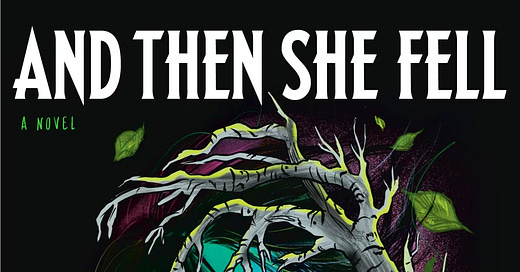And Then She Fell - 22 Feb 2024 | 8pm EST
Our 8th meeting and the first one of the second year of our book club.
On 22 Feb, at 8pm EST we will discuss And Then She Fell (2023) by Alicia Elliott (368 pgs.)
For this one, we are going to do a hybrid Zoom and in-person celebration in Toronto.
After connecting with how Elliott sets up masculinity at the beginning of And Then She Fell, (which continues throughout) I message Claudia, “this book goes hard!” I then, immediately, read one of those early passages to my partner three times in a row.
This is probably why, despite the trail of girls Mason Jamieson left behind him like bread crumbs in the forest of masculinity—girls with mascara rippling down their teenage cheeks, with heartbreak and hatred now trapped in their very marrow—Alice still desperately wanted to follow that trail straight to him.
Alicia Elliott is a Mohawk writer living in Brantford, Ontario. This is her first novel; a story that evolved out of A Mind Spread Out on the Ground (2019), her first book focused on “race, parenthood, love, mental illness, poverty, sexual assault, gentrifcation, writing and representation.”
Like Alyan in our last book, Elliott also writes from intimate experience. In 2020, she had a psychotic break, which redefined the relationship to her mother’s mania and bipolar disorder, and in turn herself. She writes, “I had become that exact crazy, lying, unreliable narrator I’d been so offput by in the past. I was living my absolute worst fear—but I was also undergoing a sort of reckoning for the ways I’d thought of, treated, and spoken about my mother.”
During her childhood her mother would, “tell me the world was ending very soon, that we should look for three days of complete darkness to descend, during which demons would knock on our doors and speak in the voices of our loved ones, trying to trick us.”
Most likely as a coping mechanism with the only language she knew at the time, Elliott positioned her “mother’s mental illness as a sort of jump scare revelation.” A framing that indulged a white model of rationality and devalued a state that isn’t a restrained controlled subject.
A state of wildness that many mothers visit or end up living in, especially after giving birth. We begin to operate in multiple worlds, on multiple timelines, on multiple planes, that criss cross in unpredictable unsettling ways, which sometimes do lead can to post-partum depression or psychosis—
Motherhood as abjection.
Motherhood as horror,
like Nightbitch made clear.
“You know, there’s meaning in your delusions and hallucinations, too,” she says. “They’re all stories. They can offer you insight into your life and the world around you, same as your regular experiences. Just cuz they only mean something to you doesn’t mean they don’t matter.”
Using horror, we see how Elliott, through Alice and her husband’s annoying academic clique takes down the white model of rationality, in one of the most cinematic scenes at the dinner table.
Undergirding And Then She Fell is how these issues fuck with our own temporality but also affect the temporality of people around us. Elliott’s ability to weave time, especially the incisive method of the future in the past asks a lot of the reader, and fulfills its promise of making us consider the way our life is not just one singular timeline, but a series of durational moments that are not something we own. This reconsideration isn’t some reductive cliche that our destinies are already predetermined, but an optimism to not foreclose our potentials, even if they seem predetermined, especially if coming up against systems of oppression.
What do we owe ourselves? Our past(s)? Our future(s)?
Serendipitously, one of the people at my writing workshop (the reason I am in Toronto), Erin Soros, who has written about being hospitalized for psychosis, knows Elliott, and was there during Elliott’s writing process. “It’s incredible to hear another person describe their experience with the book in finished form. I’m getting goosebumps,” she said to me over breakfast. “Alicia didn’t think she could ever finish it.”
There is so much of the book that needs unpacking.
I cannot wait for your perspectives, as the reviews of the book were strangely stoic and unable to enter into Elliott’s brilliant storytelling skills, which Erin also lamented over.
See you on Thursday.
x
Magdalena




I listened to two interviews with her that gave me some additional perspective (she was working full time at Starbucks when she first started to publish essays!): https://open.spotify.com/episode/54lkEAYWbNLdL6EwaxOgG5?si=9790db92d7db482f
and
https://open.spotify.com/episode/4sxdC3xXWdfwJNrYryXZc4?si=14def38e4df54991